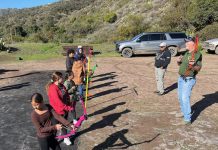The following is the fourth in a series on why the Catalina Island Conservancy was created, its unique history and mission.
The Catalina Island Conservancy maintains 88 percent or 42,100 acres of the Island as a wildlands refuge, with numerous opportunities for the public to explore and enjoy.
Access is available through Avalon, Two Harbors and Airport in the Sky—along with a road and trail system that inspires day-trippers as well as avid backpackers to discover Catalina’s natural wonders.
The following is the fourth in a series on why the Catalina Island Conservancy was created, its unique history and mission.
The Catalina Island Conservancy maintains 88 percent or 42,100 acres of the Island as a wildlands refuge, with numerous opportunities for the public to explore and enjoy.
Access is available through Avalon, Two Harbors and Airport in the Sky—along with a road and trail system that inspires day-trippers as well as avid backpackers to discover Catalina’s natural wonders.
“There’s something for everyone who wants to experience Catalina’s wildlands in a meaningful way,” said Ann Muscat, Conservancy president and CEO.
“Hiking is one of my favorites. On the BZ Jones Hike in March, we crossed the Island at its widest point,” Muscat said.
“It offered an extraordinary opportunity to talk with friends, relax and commune with nature while we had an exhilarating workout.” Muscat said.
Exploration is not only good exercise, but according to Conservancy staff it is also good for the economy.
“With visitors able to explore the interior of Catalina, it often results in longer stays on the Island, during which visitors contribute to the local economy,” said Joe Kalla, the Conservancy’s chief operating officer.
“For instance, nearly two-thirds of both marathon and Gran Fondo athletes reported in recent surveys that they stayed in Avalon an average of two nights,” Kalla said.
“The Conservancy has worked closely with local businesses to provide information about opportunities for discovery, and many have embraced the eco-tourists seeking a natural experience on Catalina,” Kalla said.
The unique Catalina ecosystem is closely monitored and managed for impact from all human activities by the Conservancy’s Conservation Department and public and private agency partners.
Permits from the Conservancy are required to access the interior by vehicle, foot or bike.
Hiking, biking and distance running
According to Conservancy records, one of the most popular ways to explore Catalina is on foot.
The Garden to Sky Hike, beginning at the Wrigley Memorial & Botanic Garden, and the Airport Loop Trail, adjacent to the Conservancy-operated Airport in the Sky, are the two most popular hikes.
More formidable hikes include the 37.2-mile Trans-Catalina Trail, which was completely opened in 2009.
Free permits and information about exploring Catalina can be found online and at the Conservancy’s various locations.
Appropriately accessorized cyclists, riding on knobby tires and wearing helmets, enjoy the fresh air and twists and turns of the Island’s 54 miles of rugged designated bike routes on mostly unpaved roads.
Last month, 600 cyclists participated in the second Gran Fondo mountain bike event.
This year’s event also drew some celebrities in the world of cycling.
One was David “Tinker” Juaraz, a two time Olympian representing the United States. The comments heard from athletes over and over were, “Very hard ride—but worth every minute of it,” and “I’ll be back next year!”
William Wrigley Jr. sponsored the first documented swim from the Island to the mainland in 1927.
Today’s Island endurance events include: Catalina Island Eco-Marathon, Catalina Island Triathlon, Avalon 50-Mile Benefit Run, Catalina Island Conservancy Half Marathon and Catalina Island Conservancy Marathon.
The Conservancy values its partnerships with the Lion’s Club, Island schools and Avalon businesses, all of which benefit from these events and help make them successful.
Getting Around
Flying into the Airport in the Sky has been a popular way to visit the Island since the facility opened in 1946.
Last year, 1,013 commercial flights and 6,517 private flights landed at the airport.
The Aero Club is a Conservancy support group with 552 members.
The pilots gather at the airport for social fly-ins the second Saturday of every month.
The Conservancy-operated Wildlands Express Airport Shuttle is a convenient, inexpensive way to get to and from the airport, and often lives up to its name by providing glimpses along the way of Catalina Island foxes, bald eagles or bison.
And on a custom Jeep Eco Tour, guests travel along ridgelines and back roads where other tours cannot go.
In partnership with Avalon businesses, guests can modify and add to their Jeep Eco Tour.
Karen Lassiter of North Carolina, who was recently a guest on a Jeep Eco Tour with naturalist guide and driver Andrew Hobbs, said it was the “best tour I’ve ever been on … and I’ve toured the Parthenon!”
Camping on Catalina
Several campsites can be found strategically situated along the Trans-Catalina Trail: at Black Jack, Little Harbor and Parson’s Landing on Conservancy property, and at Hermit Gulch and Two Harbors on Santa Catalina Island Company land. Santa Catalina Island Resort Services operates the campgrounds on behalf of the Conservancy and provides ranger and reservation services. The Conservancy also has 17 boat-in campsites at nine locations along the channel side of the Island.
Other opportunities for the public to enjoy Catalina and the Channel Islands through the Conservancy include the annual Avalon Underwater Cleanup in February, when as many as 500 divers have participated in sweeping the bay floor clean of trash and odd treasures; the annual, summer-ending Exploring the Channel Islands trip, a getaway weekend that this year travels to Santa Rosa Island; the Volunteer Vacation’s package in partnership with the Hermosa Hotel, offering eco-friendly visitors three days and two nights on Catalina with the bonus satisfaction of helping out with conservation programs; and, opportunities through partnerships with Island camps and yacht clubs.
“We take our role of protecting Catalina’s unique natural resources very seriously,” said John Mack, chief conservation and education officer for the Conservancy.
“Thanks to the foresight of the Wrigley family, who founded the Conservancy some 40 years ago, we are here to ensure that this unique biodiversity will not be lost to the world,” Mack said.
“Catalina will always be available for future generations to explore and enjoy,” Mack said.










